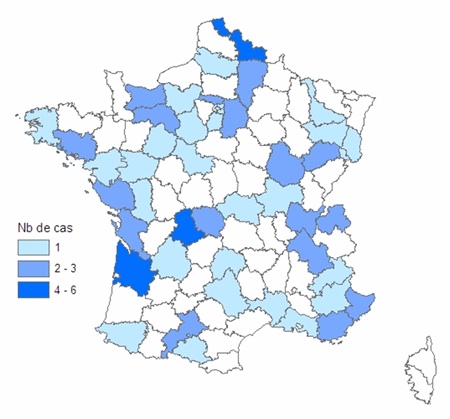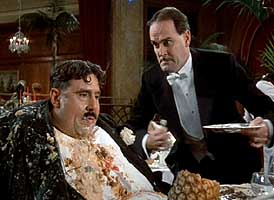Manhattan (Kansas) is all abustle this morning as parents stream in from around the state and elsewhere to watch their children graduate after four years of college. It’s .jpg) Commencement Day.
Commencement Day.
Over at Harrr–vard University, not only do they have to deal with one of the most embarrassing collapses in hockey history as the Boston Bruins were eliminated by the Philadelphia Flyers last night, the restaurant at the venerable Harvard Faculty Club, shuttered for weeks because of a norovirus outbreak that sickened more than 300 people, will remain closed through commencement, the height of the university’s social calendar.
On Friday, the Cambridge Health Department said an investigation found that before the club closed for the first time, 14 employees were working while they were sick and an undetermined number of employees were working less than 72 hours after they had become free of norovirus symptoms.
Louise Rice , director of public nursing for Cambridge, told the Boston Globe that state law requires that restaurant employees who become sick can not return to work until their symptoms have been gone for 72 hours.
I guess Harrr—vard has its own rules. And it must be hard to find good help for Harrr—vard, which may explain why they are advertizing for a Environmental Health Safety Officer to provide routine HACCP-based and food-code compliance inspections at university dining facilities (thank-you, barfblog reader).
Rice further said the city’s investigation found that approximately 308 people became sick at the club, and 33 of them were employees—which is about 40 percent of the club’s staff, adding,
“Having so many sick employees probably drove the contamination of the space.”
One of those sickened was 80-year-old Robert Cogan, a professor at the New England Conservatory in Boston.
.jpg) After an ill-fated Easter brunch put him in the hospital for almost a month, he finally returned home last week. The gastrointestinal ailment led to a string of complications that put Cogan in intensive care for four days and extended stays at Massachusetts General Hospital and Spaulding Rehabilitation Hospital.
After an ill-fated Easter brunch put him in the hospital for almost a month, he finally returned home last week. The gastrointestinal ailment led to a string of complications that put Cogan in intensive care for four days and extended stays at Massachusetts General Hospital and Spaulding Rehabilitation Hospital.
Cogan said he’s “very disappointed” that before he ate his Easter brunch on April 4 no one at the club informed him that the restaurant had just reopened after a norovirus outbreak.
“If we’d known that, we certainly wouldn’t have gone,” said Cogan, who said he used to frequent the club for brunch.
 its raw goats milk, bringing the number of confirmed sick people to 24.
its raw goats milk, bringing the number of confirmed sick people to 24.
.jpg) into hospital after suffering complications before being discharged last night.
into hospital after suffering complications before being discharged last night.(2).jpg) Public health officials questioned 286 of the more than 300 people who attended the Chef’s Challenge and found 206 became ill, said Andrew Taylor, Lambton County’s general manager of public health services.
Public health officials questioned 286 of the more than 300 people who attended the Chef’s Challenge and found 206 became ill, said Andrew Taylor, Lambton County’s general manager of public health services. had just published a book at a time when people thought that science had very little to do with cooking, setting Blumenthal on what was to become his mission in life – using science to create his now famous culinary masterpieces.
had just published a book at a time when people thought that science had very little to do with cooking, setting Blumenthal on what was to become his mission in life – using science to create his now famous culinary masterpieces.(1).jpg) The number of ill people identified in each state with this strain is as follows: AZ (2), CA (17), CO (1), ID (5), IL (1), MO (1), NM (1), NV (2), OR (2), PA (1), and WI (2). Among those for whom information is available about when symptoms started, illnesses began between March 1, 2010 and May 16, 2010. Case-patients range in age from <1 to 75 years old, and the median age is 36 years. Sixty-six percent of patients are female. Among the 30 patients with available hospitalization information, 7 (23%) were hospitalized. No deaths have been reported.
The number of ill people identified in each state with this strain is as follows: AZ (2), CA (17), CO (1), ID (5), IL (1), MO (1), NM (1), NV (2), OR (2), PA (1), and WI (2). Among those for whom information is available about when symptoms started, illnesses began between March 1, 2010 and May 16, 2010. Case-patients range in age from <1 to 75 years old, and the median age is 36 years. Sixty-six percent of patients are female. Among the 30 patients with available hospitalization information, 7 (23%) were hospitalized. No deaths have been reported..jpeg) Cook sprouts thoroughly to reduce the risk of illness. Cooking kills the harmful bacteria.
Cook sprouts thoroughly to reduce the risk of illness. Cooking kills the harmful bacteria.
 A traceback showed that these sausages came from the same batch produced in a single firm in France, distributed nationally during the first two weeks of March 2010. The best by date for this batch extends from June 1 to 15, 2010.
A traceback showed that these sausages came from the same batch produced in a single firm in France, distributed nationally during the first two weeks of March 2010. The best by date for this batch extends from June 1 to 15, 2010. A Country Springs Hotel line cook claims he was wrongly terminated for “sanitation reasons” after dozens of people were sickened at a banquet at the Waukesha, Wis., hotel last week, adding,
A Country Springs Hotel line cook claims he was wrongly terminated for “sanitation reasons” after dozens of people were sickened at a banquet at the Waukesha, Wis., hotel last week, adding, symptoms. The Country Springs manager told Today’s TMJ4 that’s why they "fired one employee for failure to comply with the reporting requirement policies."
symptoms. The Country Springs manager told Today’s TMJ4 that’s why they "fired one employee for failure to comply with the reporting requirement policies." Waukesha County health officials confirmed Monday
Waukesha County health officials confirmed Monday The venerable
The venerable 
.jpg) Commencement Day.
Commencement Day.